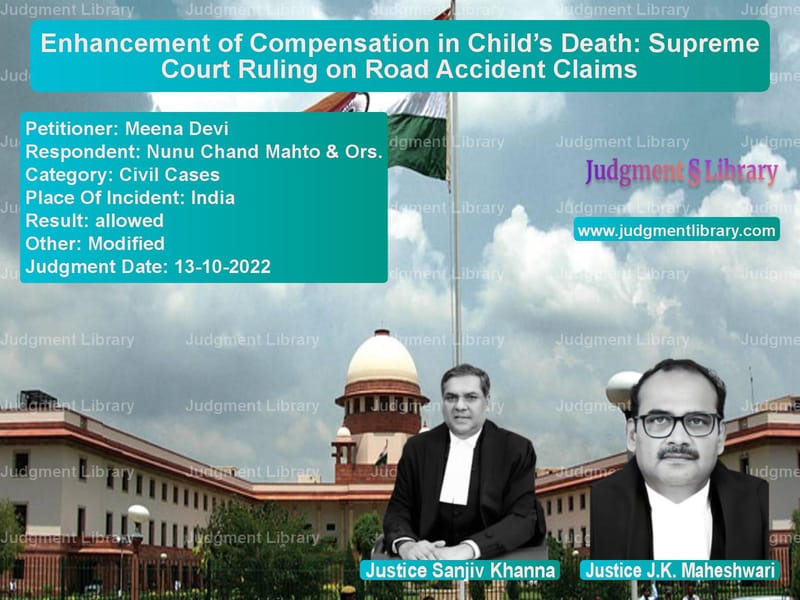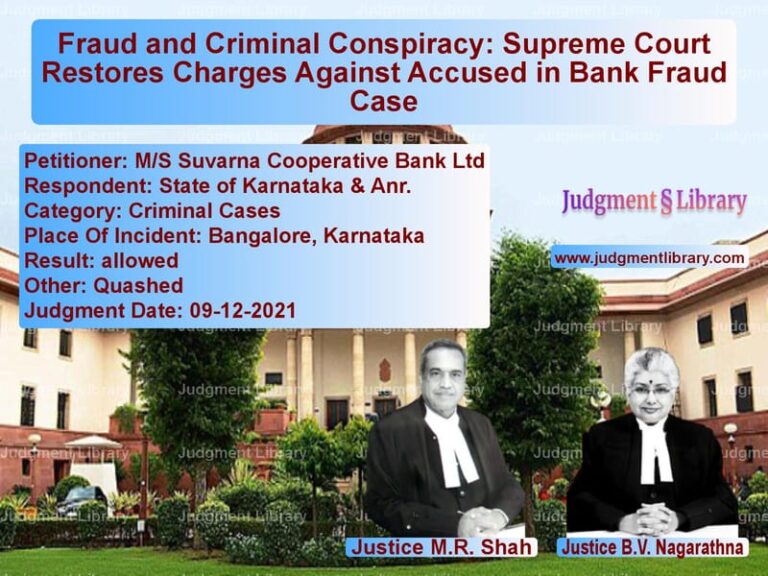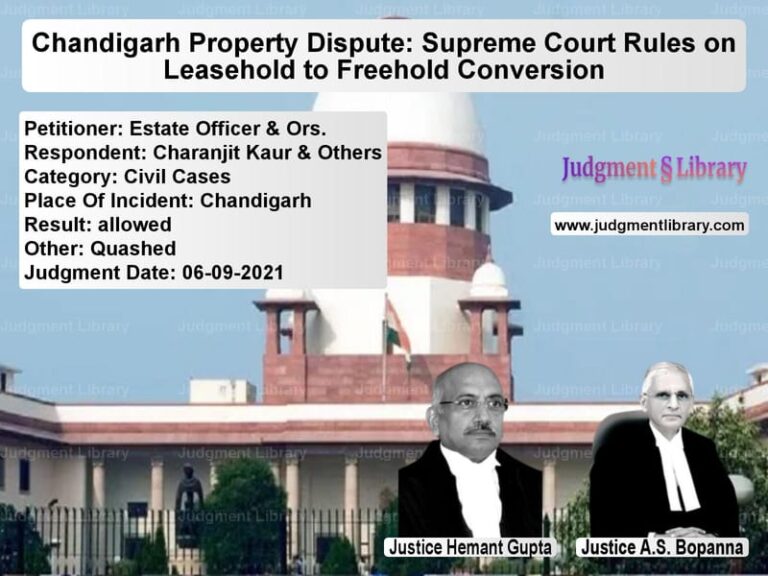Enhancement of Compensation in Child’s Death: Supreme Court Ruling on Road Accident Claims
The Supreme Court of India recently delivered a crucial judgment in the case of Meena Devi v. Nunu Chand Mahto & Ors., where the appellant, Meena Devi, sought an enhancement in the compensation awarded following the tragic death of her 12-year-old child, Bankee Bihari. The child had died on July 29, 2003, after being struck by a Commander Jeep while playing in front of his house. The initial compensation, which was found inadequate, was contested by the appellant, leading to this appeal.
This case is significant because it involves the computation of compensation for a minor’s death, where the Court had to consider several factors, including the child’s future prospects, educational background, and the non-pecuniary loss suffered by the family. The dispute revolved around whether the amount of compensation awarded by the lower courts, including the Motor Accident Claims Tribunal (MACT) and the High Court of Jharkhand, was just and reasonable.
Background of the Case
The tragic incident occurred when Bankee Bihari, aged 12 years, was playing in front of his house in Masoodpur village, New Delhi. The child was hit by a jeep, and despite being rushed to the hospital in Dhanbad, he succumbed to his injuries. In response, the appellant, his mother, filed a claim petition under Sections 140, 166, and 171 of the Motor Vehicles Act, 1988 (M.V. Act) for compensation. The claim amount sought was Rs. 2,00,000/-.
The Motor Accident Claims Tribunal (MACT) granted a lump sum compensation of Rs. 1,50,000/-. Dissatisfied with the amount, the appellant filed a Miscellaneous Appeal No. 16 of 2013 before the High Court of Jharkhand at Ranchi, which enhanced the compensation to Rs. 2,00,000/-, matching the claim amount.
However, the appellant, still not satisfied with the adequacy of the compensation, approached the Supreme Court, arguing that the compensation should have been higher, especially considering the child’s future potential and the inadequacy of the conventional heads under which the compensation was calculated.
Appellant’s Arguments
The appellant, Meena Devi, through her counsel, raised several key arguments:
- The compensation should have included a higher amount under the conventional heads such as “loss of future happiness” and “loss of dependency.”
- The lower courts had failed to consider the future prospects of the deceased, who was a brilliant student, excelling in his studies in the 5th grade.
- The compensation amount granted by the High Court was inadequate, and the appellant cited previous judgments, including R.K. Malik and another vs. Kiran Pal and others (2009) and Kishan Gopal and another vs. Lala and others (2014), to argue for an enhancement in the compensation.
- The appellant also contended that the lower courts had not appropriately applied the multiplier method as per the judgment in Sarla Verma & Others vs. Delhi Transport Corporation and Another (2009).
Respondent’s Arguments
The respondents, represented by their counsel, opposed the appeal, presenting the following arguments:
- The compensation amount granted by the MACT and later enhanced by the High Court was just and reasonable, given the facts and circumstances of the case.
- The amount granted was in line with the provisions of the M.V. Act, and the calculation of compensation, including the notional income, was properly done by the lower courts.
- The compensation was adequate and the appeal seeking further enhancement should be dismissed.
Supreme Court’s Observations
The Supreme Court, in its judgment, reviewed the facts of the case and considered the arguments of both parties. The Court emphasized the following points:
- The deceased child was only 12 years old at the time of the accident, and although there was no direct income from the child, there was a clear potential for future earnings based on his academic excellence and bright future.
- The Court noted that previous decisions, such as R.K. Malik and Kishan Gopal, had set a precedent for enhancing compensation in cases involving children’s deaths, particularly when future prospects were apparent.
- The notional income of the deceased child was a critical factor, and the Court decided to enhance it to Rs. 30,000/-, considering the devaluation of currency over time and the child’s potential.
- The Court also applied the multiplier method from Sarla Verma, taking the appropriate multiplier based on the age of the parents and the loss of dependency, which amounted to Rs. 4,50,000/-.
- Additionally, the Court awarded a sum of Rs. 50,000/- under conventional heads like “loss of love and affection” and “funeral expenses,” which had not been sufficiently considered by the High Court.
Final Verdict
The Supreme Court, after considering the arguments and reviewing the compensation calculations, ruled as follows:
- The Court acknowledged that the compensation granted by the High Court was insufficient, particularly when taking into account the future prospects of the deceased child and the inadequacy of the conventional heads.
- The compensation was enhanced to a total of Rs. 5,00,000/-, with Rs. 3,00,000/- being the additional amount, over and above the Rs. 2,00,000/- previously awarded by the High Court.
- The enhanced compensation amount was to carry interest at 7% per annum from the date of the Claim Petition until the realization of the amount.
- The United India Insurance Company (respondent No. 4) was ordered to pay the enhanced compensation amount within four weeks from the date of the order.
Implications of the Judgment
This ruling is significant for several reasons:
- The Court’s decision reaffirms the principle that compensation in road accident cases must not be limited to the claim amount but should be based on the just and reasonable needs of the victim’s family, considering future prospects and the non-pecuniary loss.
- The judgment also emphasizes the importance of applying the multiplier method and the notional income approach to determine a fair compensation amount in cases involving the death of minors.
- The ruling provides clarity on the calculation of compensation in cases where a child’s future potential is an important factor, ensuring that families of minors who lose their lives in accidents are adequately compensated for both pecuniary and non-pecuniary losses.
The decision further highlights the role of the judiciary in ensuring that families are not left without sufficient compensation for the untimely death of a child, and it sets a precedent for future cases involving the death of minors due to accidents.
Petitioner Name: Meena Devi.Respondent Name: Nunu Chand Mahto & Ors..Judgment By: Justice Sanjiv Khanna, Justice J.K. Maheshwari.Place Of Incident: India.Judgment Date: 13-10-2022.
Don’t miss out on the full details! Download the complete judgment in PDF format below and gain valuable insights instantly!
Download Judgment: meena-devi-vs-nunu-chand-mahto-&-o-supreme-court-of-india-judgment-dated-13-10-2022.pdf
Directly Download Judgment: Directly download this Judgment
See all petitions in Contract Disputes
See all petitions in Property Disputes
See all petitions in Damages and Compensation
See all petitions in Judgment by Sanjiv Khanna
See all petitions in Judgment by J.K. Maheshwari
See all petitions in allowed
See all petitions in Modified
See all petitions in supreme court of India judgments October 2022
See all petitions in 2022 judgments
See all posts in Civil Cases Category
See all allowed petitions in Civil Cases Category
See all Dismissed petitions in Civil Cases Category
See all partially allowed petitions in Civil Cases Category







